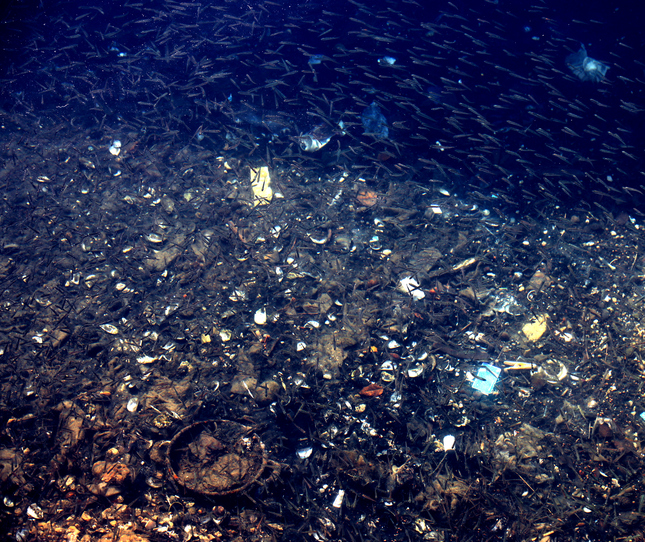The garbage island floating in the Pacific Ocean is now twice the size of Texas


A floating clump of garbage in the Pacific Ocean has grown to be more than twice the size of Texas, research published Thursday found. That's at least four times larger than previously thought, the researchers noted.
The Great Pacific Garbage Patch lies between California and Hawaii and comprises at least 79,000 tons of plastic, the study found, spanning across 617,763 square miles. To track the patch's growth, researchers flew over the area and used 18 boats to survey its true size and density.
"Ocean plastic pollution within the GPGP is increasing exponentially," they concluded. Microplastics, which are tiny fragments of plastics, make up the bulk of the 1.8 trillion pieces of debris in the patch, though the number of fishing nets present has also alarmed scientists, reports The Washington Post. The nets account for at least 46 percent of the patch's mass — a concerning statistic given sea life often become entangled in them.
The Week
Escape your echo chamber. Get the facts behind the news, plus analysis from multiple perspectives.

Sign up for The Week's Free Newsletters
From our morning news briefing to a weekly Good News Newsletter, get the best of The Week delivered directly to your inbox.
From our morning news briefing to a weekly Good News Newsletter, get the best of The Week delivered directly to your inbox.
The size of the patch is not changing as rapidly as is the sheer amount of trash, the study noted. The patch is becoming more dense, as plastics travel from all over the world on ocean currents and settle in the Pacific.
The findings present a daunting challenge to organizations seeking to clean up the mass. The United Nations estimates that there will be more plastic waste in the world's oceans than fish by 2050 without a major reduction in single-use plastic consumption.
Read more about the research at The Guardian.
A free daily email with the biggest news stories of the day – and the best features from TheWeek.com
Summer Meza has worked at The Week since 2018, serving as a staff writer, a news writer and currently the deputy editor. As a proud news generalist, she edits everything from political punditry and science news to personal finance advice and film reviews. Summer has previously written for Newsweek and the Seattle Post-Intelligencer, covering national politics, transportation and the cannabis industry.
-
 7 bars with comforting cocktails and great hospitality
7 bars with comforting cocktails and great hospitalitythe week recommends Winter is a fine time for going out and drinking up
-
 7 recipes that meet you wherever you are during winter
7 recipes that meet you wherever you are during winterthe week recommends Low-key January and decadent holiday eating are all accounted for
-
 Nine best TV shows of the year
Nine best TV shows of the yearThe Week Recommends From Adolescence to Amandaland
-
 Nobody seems surprised Wagner's Prigozhin died under suspicious circumstances
Nobody seems surprised Wagner's Prigozhin died under suspicious circumstancesSpeed Read
-
 Western mountain climbers allegedly left Pakistani porter to die on K2
Western mountain climbers allegedly left Pakistani porter to die on K2Speed Read
-
 'Circular saw blades' divide controversial Rio Grande buoys installed by Texas governor
'Circular saw blades' divide controversial Rio Grande buoys installed by Texas governorSpeed Read
-
 Los Angeles city workers stage 1-day walkout over labor conditions
Los Angeles city workers stage 1-day walkout over labor conditionsSpeed Read
-
 Mega Millions jackpot climbs to an estimated $1.55 billion
Mega Millions jackpot climbs to an estimated $1.55 billionSpeed Read
-
 Bangladesh dealing with worst dengue fever outbreak on record
Bangladesh dealing with worst dengue fever outbreak on recordSpeed Read
-
 Glacial outburst flooding in Juneau destroys homes
Glacial outburst flooding in Juneau destroys homesSpeed Read
-
 Scotland seeking 'monster hunters' to search for fabled Loch Ness creature
Scotland seeking 'monster hunters' to search for fabled Loch Ness creatureSpeed Read
